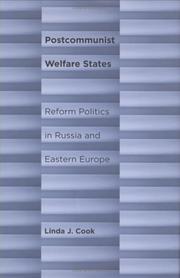| Listing 1 - 1 of 1 |
Sort by
|

ISBN: 0801479002 0801460093 9780801460098 0801445264 9780801445262 9780801445262 0801445264 9780801479007 1322503079 Year: 2007 Publisher: Ithaca : Cornell University Press,
Abstract | Keywords | Export | Availability | Bookmark
 Loading...
Loading...Choose an application
- Reference Manager
- EndNote
- RefWorks (Direct export to RefWorks)
In the early 1990's, the countries of the former Soviet Bloc faced an urgent need to reform the systems by which they delivered broad, basic social welfare to their citizens. Inherited systems were inefficient and financially unsustainable. Linda J. Cook here explores the politics and policy of social welfare from 1990 to 2004 in the Russian Federation, Poland, Hungary, Belarus, and Kazakhstan. Most of these countries, she shows, tried to institute reforms based on a liberal paradigm of reduced entitlements and subsidies, means-testing, and privatization. But these proposals provoked opposition from pro-welfare interests, and the politics of negotiating change varied substantially from one political arena to another. In Russia, for example, liberalizing reform was blocked for a decade. Only as Vladimir Putin rose to power did the country change its inherited welfare system. Cook finds that the impact of economic pressures on welfare was strongly mediated by domestic political factors, including the level of democratization and balance of pro- and anti-reform political forces. Post communist welfare politics throughout Russia and Eastern Europe, she shows, are marked by the large role played by bureaucratic welfare stakeholders who were left over from the communist period and, in weak states, by the development of informal processes in social sectors.
Post-communism --- Welfare state --- Public welfare --- State, Welfare --- Economic policy --- Social policy --- State, The --- Welfare economics --- Benevolent institutions --- Poor relief --- Public assistance --- Public charities --- Public relief --- Public welfare reform --- Relief (Aid) --- Social welfare --- Welfare (Public assistance) --- Welfare reform --- Human services --- Social service --- Government policy --- Europe, Eastern --- Russia (Federation) --- Politics and government --- POLITICAL SCIENCE --- Politics and government. --- Post-communism. --- Postkommunism --- Public welfare. --- SOCIAL SCIENCE --- Sozialpolitik. --- Välfärdspolitik --- Welfare state. --- Public Policy --- Social Services & Welfare. --- World --- Russian & Former Soviet Union. --- Human Services. --- Since 1989. --- Eastern Europe. --- Kasachstan. --- Osteuropa. --- Russia (Federation).
| Listing 1 - 1 of 1 |
Sort by
|

 Search
Search Feedback
Feedback About UniCat
About UniCat  Help
Help News
News